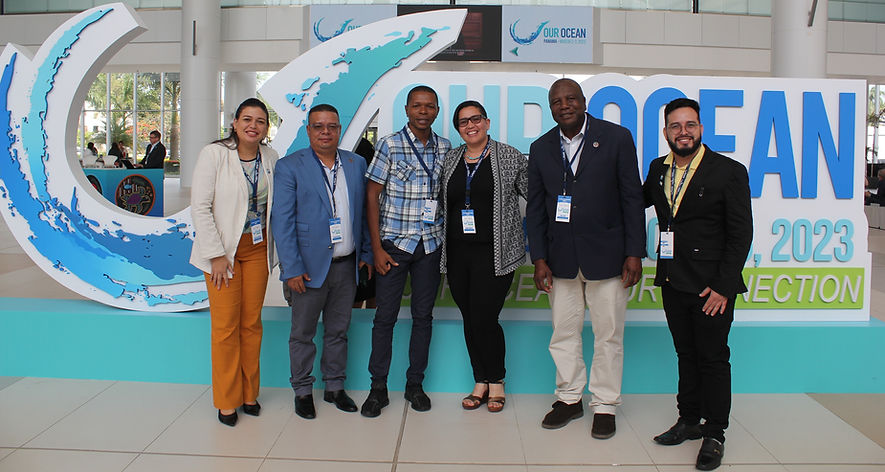
Enfrentando o desafio
O sucesso da gestão da pesca costeira depende de vários fatores de política e governança. No entanto, mesmo que todas as políticas e governança necessárias estejam em vigor, a liderança política local e a forte vontade política ainda são os fatores mais críticos para uma implementação e implantação de políticas bem-sucedidas. Os líderes do governo local são os principais tomadores de decisão no uso, gestão e proteção dos recursos costeiros; eles permitem a priorização da gestão da pesca com base na comunidade, tornam-se os maiores defensores da reforma da pesca e ajudam significativamente no avanço de políticas e compromissos financeiros para o setor.
Coastal 500, visa aproveitar este potencial, facilitando a colaboração dos líderes locais para permitir mudanças positivas na opinião pública, vontade política e políticas governamentais e financiamento relacionados ao setor pesqueiro.
Os líderes locais enfrentam uma ampla gama de desafios a serem enfrentados em suas comunidades. A adesão à rede indica que o setor de pesca costeira é uma prioridade fundamental, reconhecendo que apoia diretamente a subsistência, a segurança alimentar e a saúde dos pescadores e das comunidades que dependem desses recursos. Individualmente, os líderes locais podem criar mudanças significativas e impacto em suas comunidades locais. Juntos, sua ação coletiva pode alcançar mudanças em escala nacional e até global.
Mayor of the Municipality of Iriona, Colón, Honduras
What would you like to share at the Our Ocean conference about your municipalities and artisanal fisheries?
In Iriona, we have the seven Garífuna communities of artisanal fishermen looking for solutions to their needs, mainly to the challenges of artisanal fishing.
The declaration of the 12 nautical miles ensures that natural resources exist in the marine area for food security for present and future generations in the municipality of Iriona to benefit 1,500 families. As municipalities, we support the community proposals, and in this case, those of the artisanal fishermen, and we promise to support them in the management of this area.
Financial inclusion through savings clubs improves the economy of the families of artisanal fishermen. We have created 11 savings clubs, with 264 families benefiting from this initiative. We are making the economy more dynamic, and these invested resources remain longer in the municipality.
What does fishing mean to your community?
It means the whole life of our artisanal fishermen. Food is ensured every day on the tables by generating income through the commercialization of their products obtained from artisanal fishing.
What is the biggest challenge facing anglers today?
The main challenge is the scarcity of resources. There is no resource control over marine resources at the national level. Fishermen have to row many hours out to sea to get these resources. As a result of industrial fishing in the area, resources are running out.
Fishermen have to fish inland or move to other fishing banks and other municipalities. Industrial fishing takes the communities' food as they drag their nets and pots, taking everything.
Through the declaration of the marine zone of Iriona and Limón, we, the mayors, commit to supporting the communities of artisanal fishermen so that the industry does not fish in artisanal fishing waters.
What can mayors and local leaders around the world achieve by working together?
We can achieve better results in securing the families that live from artisanal fishing and improve the quality of life of each family in this area. If we all work for the common good, we will achieve the development of our communities and comprehensive management of marine resources.
Through our network of mayors, we can share experiences of what we are doing and how we can replicate it. We can also become a common front to influence central governments to make decisions favoring artisanal fishing and local communities.
What do you want global leaders to know about small-scale fishers and coastal communities?
Honduras is a benchmark at the national level for being a pioneer in granting rights to artisanal fishermen in my municipality and the rest of the municipalities of the Commonwealth of Garífuna Municipalities of Honduras.
Artisanal fishermen exist, and they are a vulnerable, forgotten sector that many governments do not take into account. They are made invisible. Since I started working on this process, I realized they are violated. I did not know about the risks of the activities that fishermen carry out in the sea, nor to everything they are exposed to. Sometimes it's nice to be served a fish dish at the table, but we don't realize how that fish got to our table. We don't know all the risks these fishermen take to bring us that food. We have not stopped to think about all this. For artisanal fishermen to achieve great changes in their lives, we must know how to listen to their problems and the solutions.

Wilmer Guzmán
Mayor of the Municipality of Santa Fe, Colón, Honduras
What would you like to share at the Our Ocean conference about your municipalities and artisanal fisheries?
Savings clubs are community structures that act as a local investment for women and men whose main business is artisanal fishing and agriculture. The clubs make rational use of resources and contribute to group spirit, self-confidence, and financial education, which we need most in this country: accountability and transparency. Savings clubs are the petty cash of artisanal fishermen, a source of their seed capital to develop their artisanal fishing activities.
Also, I would like to share the protection process in development with Cayo Blanco. It is a source of life, a natural resource for artisanal fishermen, and a heritage for the Santafeños, which benefits the entire population.
The process covers over 12 nautical miles. Food availability is guaranteed for our fishermen and the population in general. It is a magnificent opportunity to put less pressure on the mountain sector, as agriculture connects with fishing and the forest. It also cares for our water sources.
What does fishing mean to your community?
Artisanal fishing is a tradition. It is culture. It is heritage. It is a source of life and community spirit. It is the safest and most reliable way to guarantee families' income. After remittances, it is the second most important economic activity. It is parallel to the activity of agriculture and livestock.
What is the biggest challenge facing anglers today?
The ravages of climate change are one of the biggest challenges. Also, there are no government policies to grant them rights. The promotion of trawling threatens food security, putting local families at risk.
What can mayors and local leaders around the world achieve by working together?
A lot. The same act of sharing experiences to make a common front to raise the voice in favor of the artisanal fishermen. Artisanal fishermen are seen as the lowest in the economy of the countries. As mayors and local leaders, we can promote public policies of municipalities and reach central governments. We can promote cooperation and twinning agreements focused on artisanal fishing and identify market niches and opportunities for commercial exchange in favor of artisanal fishing.
What do you want global leaders to know about small-scale fishers and coastal communities?
The people of my municipality go fishing in an atmosphere of harmony.
The artisanal fishermen in my municipality are organized. They have self-confidence, which is why they prosper. We have eliminated the issue of paternalism at the municipality level. Through savings, the savings clubs are generating a social fund to develop their communities.
The strategies of the pride campaigns that Rare implements, the competitions and incentives, and the sailing competition connect communities with their culture, serving as motivation to promote conservation actions in favor of artisanal fishing.

Noel Ruíz
Municipal Secretary of Environment of Magalhães Barata, Brazil

What does fishing mean to your community?
It is one of the main sources of income of the municipality, standing out as a human subsistence activity with the permanence of identity and tradition.
What is the biggest challenge that fishermen face today?
The biggest challenges are the absence of public policies, remaining an invisible category, and the constant marginality of information.
What can mayors and local leaders around the world accomplish by networking?
The connection of global leaders is essential to unify information by establishing support points. They can generate mitigation strategies and, above all, commitment to sustainable fishing.
What do you want global leaders to know about small-scale fishermen and coastal communities?
It is necessary to warn about the lack of supervision in predatory fishing, that is, industrial fishing, a destructive activity that compromises the entire biome and the natural path of existing aquatic life, directly impacting the artisanal fisherman. Furthermore, supporting this category, specifically small-scale fishermen in the off-term period, is essential. This recognition is extremely necessary, so there is an appreciation of performance.
Silvano Costa da Silva
Municipal Secretary of Environment of Augusto Corrêa, Brazil

What does fishing mean for your community?
Fishing represents one of the main economic activities of the municipality, where fishing resources represent the main source of protein in the diet of a large part of the population.
What is the biggest challenge that fishermen face today?
Predatory fishing and, consequently, decreased fishing resources are the biggest challenges. Another challenge is the low number of registrations of municipal fishermen in the Professional Fisherman's Registry.
What can mayors and local leaders around the world accomplish by networking?
They can unify strategies to carry out the general records of fishermen and discuss public policies for carrying out fishery diagnosis. We also need permanent monitoring of stocks and socio-environmental support for the fishing community.
What do you want global leaders to know about small-scale fishermen and coastal communities?
The importance of supervision in industrial overfishing is one of the factors that most cause negative impacts for small-scale fishermen. I also want them to know the importance of specific aid for fishing communities in social vulnerability.
